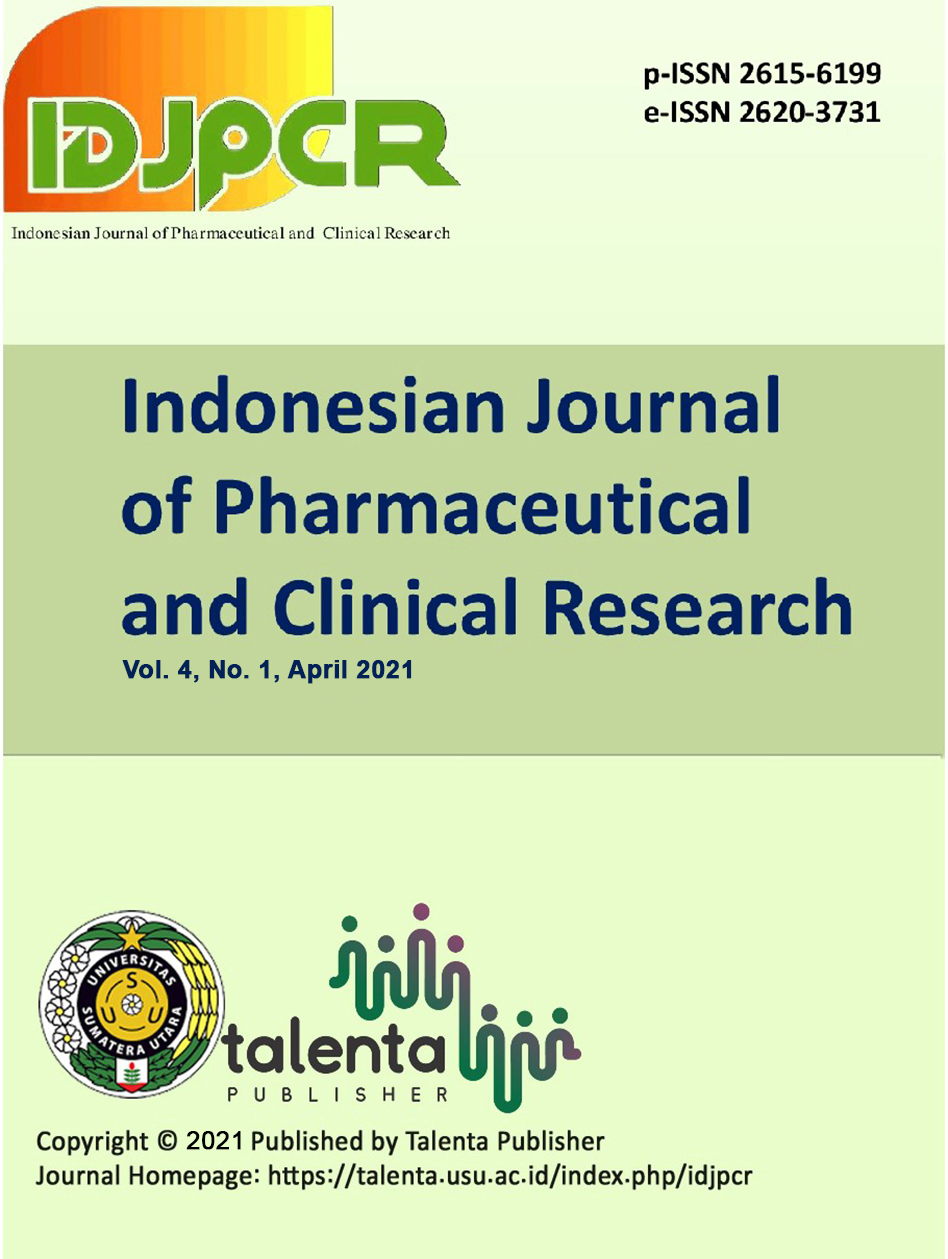Application Of Pharmaceutical Care In Pharmacy: A Specifical Study On Asthma Patients
DOI:
https://doi.org/10.32734/idjpcr.v4i1.5300Keywords:
Asthma; DRP; Pharmaceutical careAbstract
Data showed that 235 million people suffer from asthma with death rate more than 80% in developing countries. The pharmacist's role in managing asthma is to overcome drug-related problems that arise, provide information and counseling, motivate patients to adhere the treatment and assist in Medication Record. This study aims to determine the effect of the application of pharmaceutical care on drug therapy problems, adherence, therapeutic outcomes and quality of life in asthma patients. Data were carried out based on observation, interviews, and through filling questionnaires by asthma patients who redeem prescriptions at Apotek Dety Jl. Kapten Muslim No. 45A Medan from July to November 2020 who met the inclusion criteria. Number of DRP incidents obtained according to PCNE V9.0. Data were analyzed statistically used the Friedman and Wilxocon test. The result showed that There was a significant decrease in the problem group after the intervention was carried out by 93.3%. Based on the results of the study it can be concluded that the application of pharmaceutical care in asthma patients has a significant effect on reduced drug therapy.
Downloads
References
NSHC, “Asthma surveillance dataâ€. 2018. Available from: http://www.cdc.gov/asthma/asthmadata.htm. Assessed: January 2020.
Kemenkes RI, “Peraturan Menteri Kesehatan Republik Indonesia Nomor 73 Tahun 2016 tentang Standar Pelayanan Kefarmasian di Apotek. Kementerian Kesehatan. p67-69.2016
Global Initiative for Asthma (GINA), â€Global Strategy for asthma management and prevention – Update 2015â€. 2015. Available from:www.ginasthma.com. Assessed: January 2020
H.R. Tanjung, A. Sarriff, dan U. Harahap, “Analisa Cost of Illness Akibat Penggunaan NSAIDS di Sebuah Apotek di Kota Medan, Indonesiaâ€. Jurnal Ilmiah manuntung, vol. 1, no.1. pp. 52-56. 2015.
EDQM, Pharmaceutical Care: Policies and Practices for a Safer, More Responsible and Cost-Effective Health System. Europe: Council of Europe. p. 7-9. 2012
J.A. Bellanti, R.A. Settipane, “Relievers, controllers, and inhaler technique: A physician-patient challengeâ€, Allergy Asthma Proc, vol.37, no. 5, pp:347†349. 2018
A.U. Khan, I. Ali, R. Zafar, & A. Khalil, A. “Identification of drug related problems and pharmacist ’s interventions in asthmatic patients at a private tertiary care facility-Pakistanâ€, Archives of Pharmacy Practice, vol. 6, no. 2,pp. 33–37. 2015
V.GPress, V.M. Arora, K.C. Trela, R. Adhikari, FJ, Zadravecz, C. Liao, et al. “Efectiveness of interventions to teach metered-dose and Diskus inhaler techniques: a randomized trialâ€, Ann Am Thorac Soc, vol.13, no.6, pp. 816–24. 2016
RF. Shah, RM. Gupta, (2017). “Video instruction is more efective than written instruction in improving inhaler techniqueâ€. Pulm Pharmacol Ther, vol.46, no.pp. 16–9. 2017
K. Iliovska, Z. Sterjev, A.K. Nestorovska, & M.P. Bull, “Pharmaceutical care in the treatment of pediatric asthma: the role of community pharmacist†Review Paper. Pages 6-7. 2020.
Y. M. Al-Worafi, “Drug-related problems. In Drug Safety in Developing Countries†pp. 105-117, Academic Press. 2020
Downloads
Published
How to Cite
Issue
Section
License
Copyright (c) 2021 Indonesian Journal of Pharmaceutical and Clinical Research

This work is licensed under a Creative Commons Attribution-ShareAlike 4.0 International License.
The Authors submitting a manuscript do so on the understanding that if accepted for publication, copyright of the article shall be assigned to Indonesian Journal of Pharmaceutical and Clinical Research (IDJPCR) and Faculty of Pharmacy as well as TALENTA Publisher Universitas Sumatera Utara as publisher of the journal.
Copyright encompasses exclusive rights to reproduce and deliver the article in all form and media. The reproduction of any part of this journal, its storage in databases and its transmission by any form or media, will be allowed only with a written permission from Indonesian Journal of Pharmaceutical and Clinical Research (IDJPCR).
The Copyright Transfer Form can be downloaded here.
The copyright form should be signed originally and sent to the Editorial Office in the form of original mail or scanned document.









